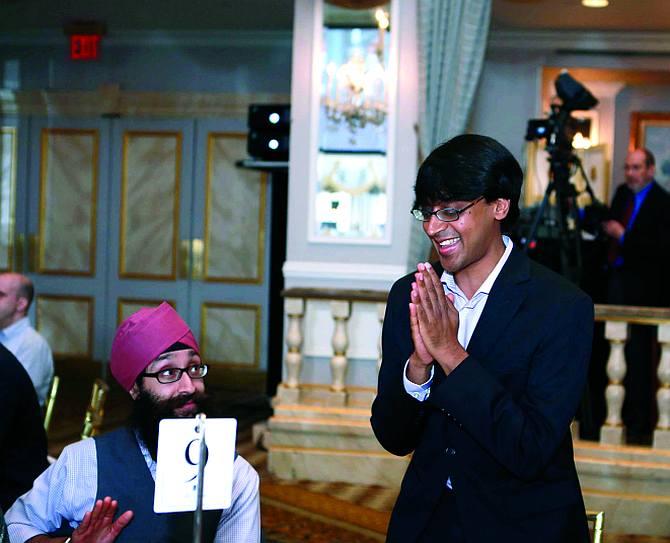 | « Back to article | Print this article |
Dr Manjul Bhargava, who was recently awarded Fields Medal, math's biggest global honour, tells P Rajendran that society's attitude towards the subject is changing slowly
Dr Manjul Bhargava has won yet another award. This time it just happens to be the top honour in math, the Fields Medal.

"It's quite an experience -- the amount of media attention," Dr Bhargava tells India Abroad on the phone from Seoul, South Korea. "This is a big international convention. There's 6,000 mathematicians here. The feeling of walking down the street and being (asked to pose for) pictures is very new to me, very overwhelming. That's what I'm experiencing. This (interview) is the quietest moment I've had in two days!"
Told to savour it while he can, given that he will be going back to places where such adulation is in short supply, he says with his characteristic low laugh, "I'm looking forward to it. I don't think I can do this for many days."
He says he learned that he was picked for the award several weeks ago.
 |
"We were told to keep it completely secret," he says, adding that only those people who came with him were to be informed. Those would be his mother Mira Bhargava, a mathematics professor at Hofstra University, a couple of cousins, an uncle and aunt, nephews and nieces.
"Indian families are very big," Dr Bhargava says with a characteristic, diffident laugh.
There were 10 relatives in all, a couple of college roommates and two mentors. Andrew Wiles, under whom he worked on his PhD at Princeton, was not able to come.
"He'd written to me that he wanted to but wasn't able to make it," Dr Bhargava says. "He said he'll be there in spirit."
Of the mentors, one was Joseph Gallian, his mentor during a summer research undergraduate programme in Duluth, Minnesota.
"He was encouraging and supportive to me for so long that I had to tell him and invite him," Dr Bhargava laughs. "I told him and he immediately said, 'I'm coming'."
Then there was Benedict Gross, his undergraduate adviser at Harvard University, and who delivered the commendation address for him.
What does this honour mean -- if anything -- for Indian math?
"I hope it will be source of encouragement and inspiration to the Indian people, both in India and also Indian Americans, to take on mathematics and scientific research."
Are schools in rural areas good enough?
"In the early years," he says, "as long as you have some good teachers in elementary school or high school, even in the rural areas you can get adequate background. And once you reach a certain level it's true you have to leave that area and go to a research institution."
He points to the other Indian honouree at the International Congress of Mathematicians, Rolf Nevanlinna Prize winner Dr Subhash Khot.
"Even he grew up in a rural area," Dr Bhargava says. "He had a good mathematics teacher. Once he reached a certain level, he went to IIT (Indian Institute of Technology) to get an education. I don't necessarily think it is the lack of teachers as much as it is the societal attitude. A child is good in mathematics means (s/he) should go into engineering or … go and do medicine. Scientific research or mathematical research is not an option that society, at the moment, considers a reasonable career option. That's changing now slowly. There are a lot of new IITs now; there are a lot of opportunities to do research."
On his work, Dr Bhargava says, "I like to work on many things at once. But that is one thing I like to think about (the Birch and Swinnerton-Dyer conjecture). It's definitely one of my favourite problems. We proved that for more than 66 per cent of elliptic curves the conjecture is true. Before that, it wasn't even known that it was more than zero percent true." He laughs. "This is an indication that the conjecture's true but, of course, it's not a total proof."
There may be many more ideas needed. Does he have the tools and techniques to do it?
"It's hard to know until you try. I have many ideas." He laughs. "Most likely they will fail. But I have some things I want to try. If you go out with 20 ideas, maybe one has a chance of working."
What lies ahead for him after the Fields Medal, the ultimate award in his field?
Dr Bhargava laughs in some embarrassment.
"Mathematicians don't do their work for the awards," he says. "These things are nice when they happen. The real joy of math continues."